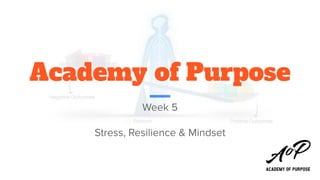Academy of Purpose - Stress, Resilience, & Mindset - Week 5
- 2. Class outcomes Understanding and managing stress? We will explore Resilience and how you can develop yours. You will understand how your mindset affects whatŌĆÖs going on around you.
- 3. Outline of this session
- 5. 1. Stress and how it impacts us ŌĆ£Is all stress bad?ŌĆØ It begins with awareness. You need to begin by recognising when you are stressed. Then you can begin to take action to reduce it. What strategies do you need to put in place?
- 6. How humans function? Here is a more in depth look at how stress can have a diminishing law of returns on our performance. The trick is staying in the stretched rather than stressed zone
- 7. How does stress affect our brains This image shows the amygdala when it is very aroused, the neocortex shutting down and the fight and flight response engaged. This can lead to distress and is a performance killer. The trick is reminding ourselves that our life is not on the line and doesnŌĆÖt warrant a full code red response. We are not in the jungle being chased by a tiger in which case FEAR stands for Forget Everything And Run! It is more likely to be a fear False Expectations Appearing Real. Most of what we fear never happens. The danger of treating everything with a code red response is that the cortisol deposits buildup in the bloodstream. It is not good for our health - and our performance is affected and can lead to burnout, panic attacks etc. So recognising stress build up and having tools to combat it are important.
- 8. Resilience is about our ability to bounce back when things donŌĆÖt go to plan or when things go wrong, i.e. from stressful situations.The ability to be resilient exists in everybody, but we need to nurture and build our resilience so that we can use it as our armour during tough times.
- 9. 3. How to build Resilience 1. 2. 3. 5. 6.
- 10. 3.a - Express Yourselves
- 11. 3.b - Nourish Yourself
- 14. Remember standing up and moving about every 30 mins. reduces the risk of heart disease and improve your overall wellbeing.
- 15. Sleep and its importance ŌŚÅ ŌŚÅ ŌŚÅ ŌŚÅ ŌŚÅ
- 16. Tips for healthy sleep ŌŚÅ ŌŚÅ ŌŚÅ ŌŚÅ ŌŚÅ ŌŚÅ ŌŚÅ
- 17. 3.c - Choose your Mindset One of the key things that can hold us back from our success is the mindset with which we approach situation. We know that we can grow our brains and that intelligence grows with effort. Mindset is about the approach or attitude that people take, its having that underlying belief that you are in control of your own destiny.
- 19. How Mindset Affects You ŌĆ£At this challenging time Mindset is more important than anything. Also, we need to be aware of what affects our mindset? What do you think currently might be affecting your mindset? What can you do to change it? What might be the outcomes?ŌĆØ
- 20. The ’¼ürst one telegrammed back ŌĆ£waste of trip - nobody wears shoes out here! ŌĆØ The other salesman telegrammed back 'unbelievable opportunity here to sell shoes - nobody is wearing any - send shoes!' ŌĆØ
- 21. 3.d - Showing Gratitude ŌŚÅ ŌŚÅ ŌŚÅ What are you grateful for? Keep a Gratitude Journal, it can be as simple as writing down or saying to yourself, 3 things you are grateful for every day. Try it and see how it feels after a couple of weeks
- 22. 3.e - Recognising Your Strengths
- 23. 3.f - Learning to Relax
- 24. Over a 24 hour period we can process 70,000 thoughts and this continues even as we sleep. This equates to a different thought every 1.2 seconds or two thoughts for every heartbeat. A lot of our thoughts are the eternal internal dialogue, which, when left unchecked, can turn to the dark side. This negative kind of thinking can become much more persuasive and dominant than the positive and supportive kind. Unfortunately, when we turn off the lights and lie in the dark, this can be when our thoughts are the loudest. Thoughts can become obsessive and intrusive; they can also become stuck and repetitive. Just like a computer, your brain can fill up with junk and for some reason this junk takes up more memory and space than the important stuff. When your memory is full of junk it becomes difficult to concentrate and focus. E.g. Covid19 This kind of thinking can lead to stress, anxiety, depression and burnout.
- 25. The Power of Mindfulness Some people may find meditation very challenging. This is fine. There are other ways of being mindful. You can go for a mindful walk, mindful eating, doing yoga, poi, gardening, art, music, and so many more. When you become present and notice the thoughts passing through rather than engaging or feeling lost within them. Be gentle and take your time
- 26. 4. Unplug and Unwind ŌŚÅ ŌŚÅ ŌŚÅ ŌŚÅ ŌŚÅ ŌŚÅ
- 27. What did we/you learn today?
- 28. Love to hear what you thought so far




























